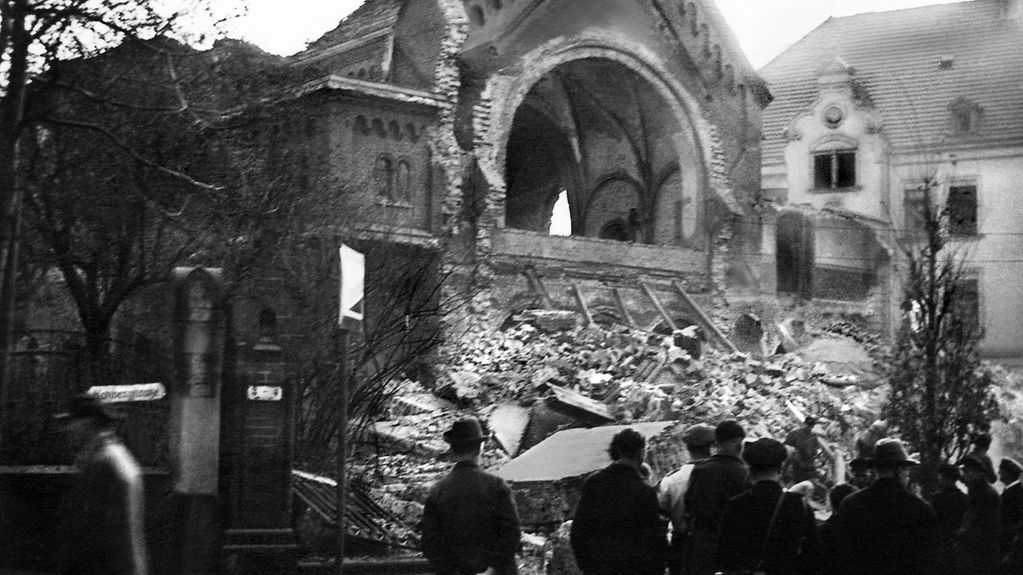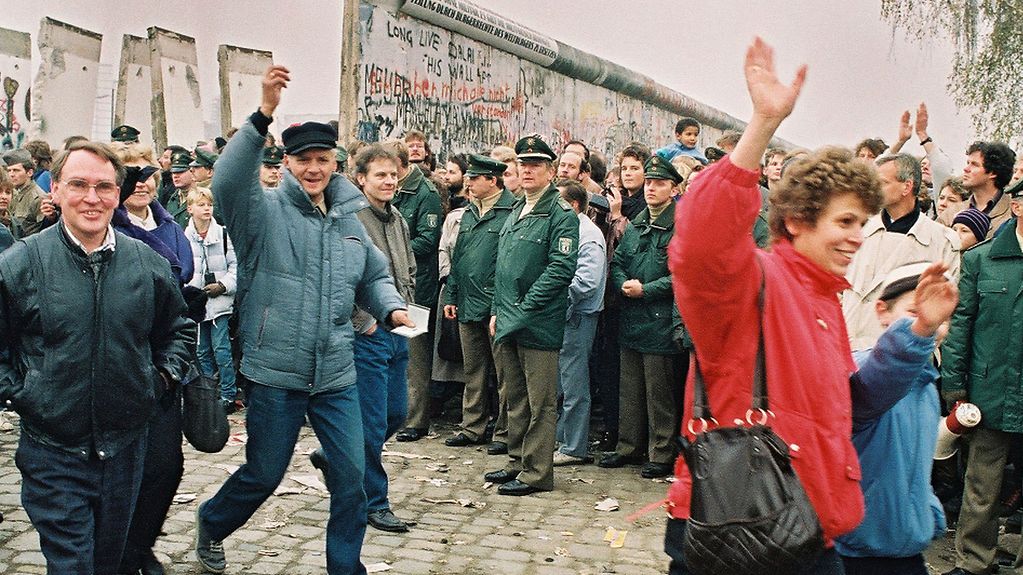Remembrance and commemoration
The events that played out in November 1918, 1938 and 1989 embody both the crimes of the German Reich and the hopes of Germans. The country must be accountable.
4 min reading time

Anti-Jewish terror - during the Reichspogromnacht the Old Synagogue in Chemnitz was wrecked and destroyed
Photo: picture-alliance/JudaicaSammlungRichter
Many people today associate 9 November above all with the day the Berlin Wall fell in 1989. But this year, one of the darkest chapters in Germany’s history takes precedence: during the Reichspogromnacht on 9 November 1938, 1,400 synagogues were torched. SA and SS thugs wrecked Jewish businesses. Thousands of Jews were assaulted or arrested.
The Holocaust has left its mark on Germany to the present day
The Reichspogromnacht 80 years ago was another step towards the most monstrous genocide the world has ever seen, the Holocaust. Six million Jews were killed. Germany will always be accountable for it. Recently the dreadful attack on a synagogue in Pittsburgh demonstrated only too clearly where blind hatred against people of the Jewish faith leads even today. History teaches us the need to stand up strongly to anti-Semitism – in Germany and everywhere else in the world.
At an event hosted by the Federal Press Office the Federal Government Commissioner for the Fight against Anti-Semitism, Felix Klein, recently stated that inhibitions are being neutralised in the discussion. "That is a threat to our entire political culture of remembrance. This is where we must say ‘Stop’". He advocated taking the "anonymous helpers" from that time as our role models. The Red Orchestra, the White Rose and the police officers from the 16th Berlin Precinct, who prevented the Nazis from burning down the synagogue in the Oranienburger Straße, all offer an example for us to follow. "The actions of the individual can make the difference." Klein called on his audience to turn their gaze more to people who had an inner compass and stood up to national socialism.
A ceremony hosted by the Central Council of Jews in Germany at the Rykestrasse synagogue in Berlin is to mark the 80th anniversary of the Reichspogromnacht. The Chancellor will speak.
The fall of the Berlin Wall paved the way for reunification
The part of German history that began with the Reichspogromnacht and the rise of national socialism, that went on to the Second World War and the division of Germany, also ended on 9 November, when the Berlin Wall fell in 1989.
With his awkwardly worded announcement regarding new freedom to travel for citizens of the German Democratic Republic, Günter Schabowski, member of the East German Politburo triggered a stampede of thousands of East Germans to the border controls between East and West Berlin. Many had been watching the televised press conference on the new travel regulations. Still incredulous, the first of them set off to the control points. But as the evening went on the crowds got larger, and the situation at the border controls escalated. After a flurry of hectic telephone calls from border guards to their commanding officers, leading executives of the ruling party, the SED, and the East German leaders, the crunch came half an hour before midnight: the first border crossing point between East and West Berlin was opened at the Bornholmer Strasse in Berlin. Jubilant crowds passed the crossing point, and one after another the other crossing points were opened – after 28 years, the Berlin Wall was relegated to the history books and the way was open for German reunification.

East Germans surge across the border crossing point at the Potsdamer Platz shortly after the Berlin Wall fell on 9 November
Photo: Bundesregierung/Specht
9 November – a date with a history
And finally, 100 years ago on 9 November 1918, the monarchy in Germany gave way to democracy. It was a huge achievement, a victory won on the political ruins of the First World War. Germany’s impending defeat in the First World War led to unrest inside Germany. The November Revolution, which began with a mutiny among sailors in Kiel and Wilhelmshaven, reached Berlin on 9 November. So concerned was he of the threat of a revolution, that Prince Maximilian of Baden, Chancellor of the German Empire, himself declared that Kaiser Wilhelm II was abdicating. That marked the end of the German Empire. The deputy chairman of the social democrats, the SPD, Philipp Scheidemann, proclaimed the first German republic.
On 11 November 1918 the First World War ended. In the French town of Compiègne, the new German government signed an armistice in which Germany accepted its defeat. More than nine million people lost their lives in the four years of fighting.
Chancellor Angela Merkel and French President Emmanuel Macron will remember the victims of the fighting when they unveil a bilingual remembrance plaque in Compiègne. In the ‘Compiègne Wagon’ they will then both write in the Golden Book to mark the 100th anniversary of the end of the First World War.
Remembering events
The German government keeps alive the memories of these events. It supports nationally significant memorial sites that remember the reign of terror of the national socialists and pay tribute to their victims, as well as sites that appraise the dictatorship in the German Democratic Republic.